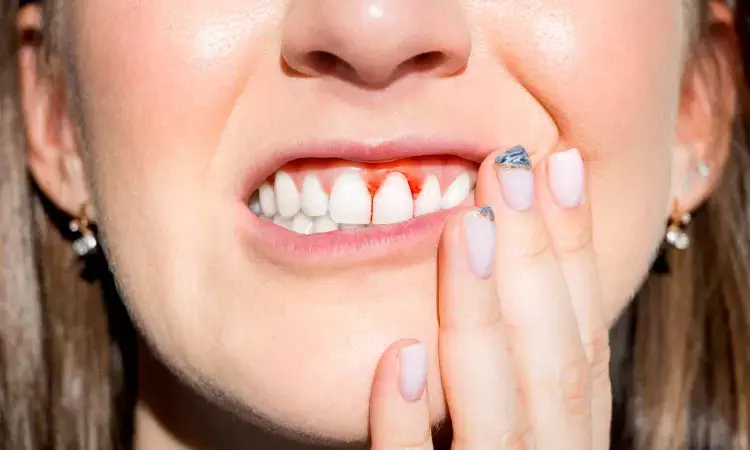- Home
- Medical news & Guidelines
- Anesthesiology
- Cardiology and CTVS
- Critical Care
- Dentistry
- Dermatology
- Diabetes and Endocrinology
- ENT
- Gastroenterology
- Medicine
- Nephrology
- Neurology
- Obstretics-Gynaecology
- Oncology
- Ophthalmology
- Orthopaedics
- Pediatrics-Neonatology
- Psychiatry
- Pulmonology
- Radiology
- Surgery
- Urology
- Laboratory Medicine
- Diet
- Nursing
- Paramedical
- Physiotherapy
- Health news
- Fact Check
- Bone Health Fact Check
- Brain Health Fact Check
- Cancer Related Fact Check
- Child Care Fact Check
- Dental and oral health fact check
- Diabetes and metabolic health fact check
- Diet and Nutrition Fact Check
- Eye and ENT Care Fact Check
- Fitness fact check
- Gut health fact check
- Heart health fact check
- Kidney health fact check
- Medical education fact check
- Men's health fact check
- Respiratory fact check
- Skin and hair care fact check
- Vaccine and Immunization fact check
- Women's health fact check
- AYUSH
- State News
- Andaman and Nicobar Islands
- Andhra Pradesh
- Arunachal Pradesh
- Assam
- Bihar
- Chandigarh
- Chattisgarh
- Dadra and Nagar Haveli
- Daman and Diu
- Delhi
- Goa
- Gujarat
- Haryana
- Himachal Pradesh
- Jammu & Kashmir
- Jharkhand
- Karnataka
- Kerala
- Ladakh
- Lakshadweep
- Madhya Pradesh
- Maharashtra
- Manipur
- Meghalaya
- Mizoram
- Nagaland
- Odisha
- Puducherry
- Punjab
- Rajasthan
- Sikkim
- Tamil Nadu
- Telangana
- Tripura
- Uttar Pradesh
- Uttrakhand
- West Bengal
- Medical Education
- Industry
Autologous Platelet-Rich Concentrates Show Potential in Periodontal Therapy, but Evidence Remains Inconclusive: Meta-Analysis

Malaysia: A recent systematic review and meta-analysis of randomized controlled trials (RCTs) evaluated the effectiveness of autologous platelet-rich concentrates (APC) as an adjunct to nonsurgical periodontal therapy (NSPT). The findings were published online in Evidence-Based Dentistry.
After reviewing the available studies, the authors found that the use of APC alongside NSPT showed potential benefits in improving clinical parameters, such as probing depth, clinical attachment level, and bleeding on probing. However, the strength of the evidence was limited. A significant number of studies involved small sample sizes, which reduced the generalizability of the results. Additionally, the quality of the trials was compromised by moderate to high risk of bias in most of the studies, primarily due to issues with randomization, blinding, and the handling of data.
Platelet-rich concentrates, derived from a patient’s own blood, are believed to promote tissue healing and regeneration. Previous studies have explored the potential of APC in periodontal therapy, with promising results, particularly in accelerating healing and reducing inflammation. However, the overall evidence remained inconclusive due to inconsistencies across studies and the quality of the research.
To fill this knowledge gap, Nazurah Nik Eezammuddeen, Universiti Teknologi MARA, Jalan Hospital, Sungai Buloh, Malaysia, and colleagues aimed to assess the effectiveness of autologous platelet concentrates in improving periodontal outcomes in patients undergoing nonsurgical therapy for periodontitis.
For this purpose, the researchers conducted an electronic search through Web of Science, MEDLINE via PubMed, Scopus, and Cochrane CENTRAL registry, along with a manual search from June to July 2024 for relevant publications. Studies were included if they reported on periodontal outcomes after adjunctive APC in NSPT and excluded if unpublished or not in English. Two independent reviewers assessed the articles, and the risk of bias was evaluated using the Cochrane risk-of-bias tool (RoB 2). A fixed-effect meta-analysis was performed to measure changes in periodontal pocket depth (PPD) and clinical attachment level (CAL), with statistical heterogeneity assessed using the I2 test.
Key Findings:
- A total of 607 records were identified from four electronic databases.
- After removing duplicates and conducting initial title screening, 16 full-text articles from the electronic search and seven articles from the manual search were assessed.
- Ultimately, 13 studies were included in the systematic review.
- Most studies had a moderate to high risk of bias.
- The fixed-effect meta-analysis showed that adjunctive APC use in nonsurgical periodontal therapy favored positive outcomes but with high heterogeneity between studies, particularly for CAL.
Based on the findings, the researchers concluded that the evidence supporting the use of APC as an adjunct in NSPT is limited due to the small number of studies, the moderate to high risk of bias in most studies, and significant heterogeneity in the results.
Reference:
Nik Eezammuddeen, N., Johari, N. N., Demius, O., & Hussain, F. (2024). The effectiveness of autologous platelet-rich concentrates as an adjunct during nonsurgical periodontal therapy: A systematic review and meta-analysis of randomized controlled trials. Evidence-Based Dentistry, 1-8. https://doi.org/10.1038/s41432-024-01060-0
Dr Kamal Kant Kohli-MBBS, DTCD- a chest specialist with more than 30 years of practice and a flair for writing clinical articles, Dr Kamal Kant Kohli joined Medical Dialogues as a Chief Editor of Medical News. Besides writing articles, as an editor, he proofreads and verifies all the medical content published on Medical Dialogues including those coming from journals, studies,medical conferences,guidelines etc. Email: drkohli@medicaldialogues.in. Contact no. 011-43720751


